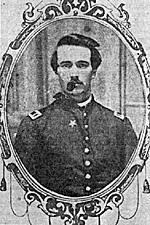 John M. Bloss mustered in on September 12, 1861, was from Salem, Indiana, and was sergeant of Co. F, 27th Indiana Volunteers Infantry.
John M. Bloss mustered in on September 12, 1861, was from Salem, Indiana, and was sergeant of Co. F, 27th Indiana Volunteers Infantry.
On September 13, 1862, Bloss or Corporal Mitchell found "Lee's lost dispatch" prior to the bloody battle of Antietam. Historians are still debating which of the two men found the dispatch, but in any event, the papers were turned over to General Nathan Kimball, who happened to be Bloss's uncle.
Both Corporal Mitchell and Sgt. Bloss were "rewarded" for their efforts by being wounded four days later at Antietam. Bloss was treated for his wounds at Maryland Heights for two months before being able to continue his career as a soldier in the field and to achieve further fame.
A probable reason for a lack of identification of the exact finder of the lost orders was that McClellan was reluctant to publicize his decided edge in the battle by having Lee's orders due to the fact that the results were indecisive. Such a fact, were it made known, would surely not reflect well on his command skills.
Sgt. Bloss was commissioned a 1st Lieutenant on September 18, 1862, Captain on April 27th, 1864, and mustered out on November 4th, 1864. His record was a valiant one, being wounded at Winchester, Antietam, Resaca, and Chancellorsville. He served extensively as commander of Pioneers and superintendent of bridge and stockade building. Company F had a total enrollment of 105 men. Its battle loss was 12, with eight others being lost due to "other causes." The 27th Indiana Volunteer Infantry fought both in the East and the West, including the battles of Winchester, Cedar Mountain, Antietam, Chancellorsville, Gettysburg, Atlanta Campaign, Resaca, Pumpkin Vine Creek, New Hope Church, Allatoona Hills, operations about Marietta, and Kenesaw Mountain. The regiment lost 10 officers and 159 enlisted men killed and mortally wounded.
After the war, Captain Bloss pursued a career in teaching and became the president of a state agricultural college in Illinois. He later retired to a farm near Muncie, Indiana. Unfortunately, we will never know whether Bloss was the actual finder of the lost orders, but evidence does seem to point in that direction. Even more unfortunate (from the Union point of view) was the fact that McClellan, with the greatest edge any commander during the war was given, did not make more of his advantage, given to him by a soldier from the fighting 27th Indiana!
Back to The Zouave Vol I No. 2 Table of Contents
Back to The Zouave List of Issues
Back to Master Magazine List
© Copyright 1987 The American Civil War Society
This article appears in MagWeb (Magazine Web) on the Internet World Wide Web.
Other military history articles and gaming articles are available at http://www.magweb.com